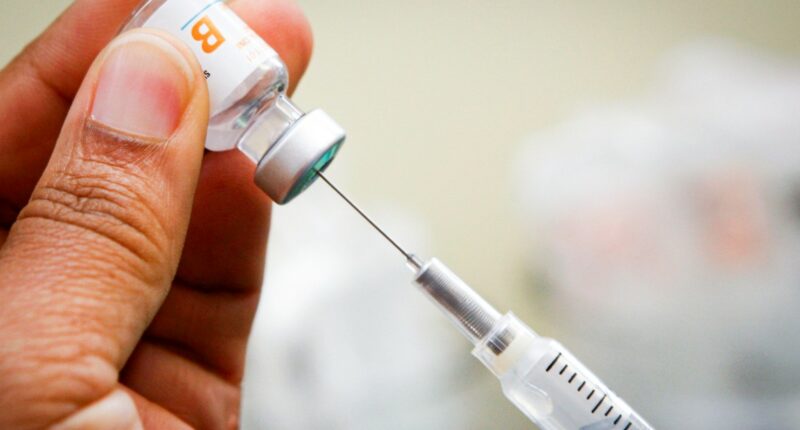Share this @internewscast.com

The Centers for Disease Control and Prevention is unlikely to revise the current guidelines for newborn hepatitis B vaccinations, as its advisory panel deferred a pivotal decision on the matter during a meeting Friday.
The panel had anticipated recommending a delay in administering the vaccine, which is currently given shortly after birth. However, some members were dissatisfied with the insufficient evidence on potential side effects and argued that more deliberation was necessary. Additionally, one member pointed out that the language set for the vote was unclear and risked causing misunderstandings.
The decision to postpone the vote highlights an irregular and disorganized approach by the Advisory Committee on Immunization Practices (ACIP), which has seen all its 12 members recently appointed under Health Secretary Robert F. Kennedy Jr. This group has shown skepticism about vaccine safety and effectiveness.
On Friday, members were supposed to decide whether to postpone the initial hepatitis B vaccine dose until a baby is at least one month old, on the condition that the mother tests negative for the virus. Presently, the vaccine is administered within 24 hours post-birth because hepatitis B — a serious, chronic infection that can cause liver disease, cancer, and potentially be fatal — can be passed from mother to child during birth.
The hepatitis B vaccination has drawn criticism from Republican lawmakers like Rand Paul of Kentucky, who challenge the necessity of immunizing newborns when their mothers test negative for the virus.
Dr. Robert Malone of ACIP stated on Thursday that the issue was addressed due to widespread public concern in the U.S. about vaccine policies, particularly the administration of the hepatitis B vaccine at birth.
However, many public health experts questioned the need for a vote without new data to analyze.
Minutes before tabling the subject, the ACIP voted unanimously to recommend testing all pregnant women for hepatitis B. A spokesperson for the Department of Health and Human Services said the test is covered across insurance programs and the goal of the vote was to encourage providers and health systems to increase testing rates.
At the meeting on Thursday, CDC staffers summarized the results of 17 studies, which found that the hepatitis B vaccine is overwhelmingly safe and has helped to virtually eliminate hepatitis B infections among newborns. The agency also noted that many pregnant women aren’t screened for hepatitis B in the U.S., making it hard to rely on testing to decide which children to vaccinate. According to the CDC, 12-16% of pregnant women in the U.S. are never tested for hepatitis B during pregnancy — and even if they are, some cases can be missed.
Several ACIP members pushed back on what they said were omissions in the CDC’s presentations, pointing to individual studies and anecdotes that they said raised questions about neuro-developmental side effects.
Two committee members, Malone and Vicky Pebsworth — both of whom have a history of sharing misinformation about vaccines — said the CDC presentations omitted a 2012 report from the Institute of Medicine. The report said it couldn’t determine whether hepatitis B vaccines were associated with brain inflammation because no studies had properly looked at that research question.
“The absence of data that statistically proves lack of safety does not mean that the product is safe,” Malone said on Friday morning.
Pebsworth also raised concerns about CDC data showing irritability or fussiness in some infants who received the hepatitis B vaccine.
“These are not trivial reactions,” Pebsworth said.
However, such symptoms are hard to attribute to vaccines because infants can be irritable or fussy regardless of vaccination.
Dr. Cody Meissner, a pediatrician and the only current ACIP member who has previously served on the committee, pushed back on Pebsworth’s concern, noting that irritability or restlessness “are certainly not objective parameters that should be used to assess safety.”
He added that no vaccine is 100% safe or effective, but that the committee was meant to decide whether protection from vaccines outweighs any possible risks.
“When you apply that to a newborn hepatitis B vaccine, I don’t think there’s any question whatsoever that the benefit far outweighs any adverse side effect,” he said.
Cases of acute hepatitis B infections among children plummeted after the CDC began recommending a universal dose at birth in 1991.
It’s unclear whether ACIP will revisit the subject in the future. If they do, liaisons from the National Foundation for Infectious Diseases, the American College of Physicians and the Society for olescent Health and Medicine called on the committee to return to a framework for vaccine recommendations that has long guided the advisory panel’s decisions. The framework considers a vaccine’s risk and benefits, whether a recommendation is feasible and how it would impact health equity.
Dr. Amy Middleman, a liaison for the Society for olescent Health and Medicine, said it’s easy to be distracted by conflicting studies.
“I would urge the committee to use the methodical, scientific method to weigh the risks and benefits appropriately,” she said.











